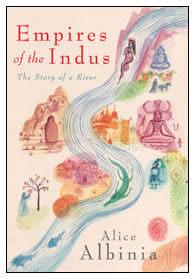Arabian Sea
Hydroelectric power projects & climate change: A case study of Ravi basin in Himachal Pradesh
Posted on 09 Apr, 2009 11:34 AMThe following is a paper by Dr. Mohinder Slariya based on data collected during his Ph.D work. The work contains data sourced from the India Water Portal, and aims to illustrate local area climate changes with the development of hydroelectric projects. The abstract of the paper has been quoted below, with the full paper available as a download!
Abstract
Dams have had serious impacts on the lives, livelihoods, cultures and spiritual existence of indigenous, tribal and illiterate people, moreover on the physical environmental conditions and on the biodiversity of the area concerned. The dam related developmental activities in Ravi catchment area have been threatening the biodiversity in the whole catchment. There are more than 50 rivulets in the Ravi catchment and on which more than 70 power projects have been planned by the government by putting biodiversity at the stake. Developmental activities have unintentionally produce weather and climate modifications on a larger scale and threaten the existing biodiversity. Such developmental activities have been started day back in 1980s in Ravi basin with the installation of Baira Suil Power Project and today it has covered all most all Ravi basin starting from interstate broader of Jammu & Kashmir, Punjab and Himachal Pradesh and engulfed the green cover of the area. Because of this extinction the catchments area is experiencing drastic climatic changes, because of 100 km reservoirs of Shahpur Kandi (125MW), Thein Dam (600MW), Chamera-I (540MW) and Chamera-II (300 MW) and tunnelization of Ravi in 19.38 kms with a dia of 7 to 9 meters and 102 meters high surge shafts with 15.5 meters dia and underground power houses of Chamera-I & II and dry Ravi in almost all its natural route (27 kilometers in Chamera I & II). In this dry region there is a tremendous increase in the temperature and there is no timely and usual rain in the basin after the installation of power projects.
Oustees demand stoppage of Maheshwar dam in front of Environment Monitoring Committee
Posted on 11 Mar, 2009 08:48 AMThe oustees of Maheshwar Dam demanded immediate stoppage of Maheshwar dam in village during the visit of the Monitoring Committee constituted by the Ministry of Environment and Forest. The oustees told the Committee that the project authorities have completely failed to rehabilitate the oustees but the construction work is going on full pace. Therefore, as per the conditions of the clearance the dam work should be stopped.
The Monitoring Committee: It may be stated that on 1st May 2001, the Ministry of Environment and Forest transferred the statutory clearance regarding Maheshwar Project to the Shree Maheshwar Hydel Power Corporation Limited (SMHPCL), the company building the dam. As per this clearance a Monitoring Committee was constituted to ensure that the rehabilitation work should be carried out at the same pace of concreting. The Committee headed by Mrs. Nirmala Buch visited the area on 23rd and 24th of February,2009.
Athirappilly satyagraha crosses one year 25th Feb 2009
Posted on 26 Feb, 2009 11:06 AMDear Friends, We welcome you to support the cause of a dying river in the Western ghats As you are aware, an indefinite Satyagraha led by Chalakudy River Protection Forum has been going on at Athirappilly near the project site since 25th February 2008. A series of programs have been organized in connection with the first anniversary of the Satyagraha to remind the conscience of the society what is in store if we tamper too much with our rivers, the people's longstanding time tested resistance to an environmentally, socially and economically unjust and unviable hydro electric project planned in one of the most beautiful rivers in the Western Ghats, the only basis of survival of millions of people and what has to be the real solution to the energy crisis in Kerala.
Book Review: Empires of the Indus
Posted on 29 Jan, 2009 10:56 AMEMPIRES OF THE INDUS : THE STORY OF A RIVER - by Alice Albinia
Pages: 366 ISBN-978-0-7195-6003-3 (978-0-7195-6004-0)
Format: hardback / trade paperback
Price: £20 / Rs. 550
Publisher: John Murray, U.K. Empires of the Indus is a comprehensive study of how the river Indus and its waterways have changed the history of the Indian sub-continent. Water is potent: it trickles through human dreams, permeates lives, dictates agriculture, religion and warfare. Ever since Homo sapiens first migrated out of Africa, the Indus has drawn thirsty conquerors to its banks. Some of the world's first cities were built here; India's earliest Sanskrit literature was written about the river; Islam's holy preachers wandered beside these waters. This perhaps captures the essence of this Guardian First Book 2008 awardee, Empires of the Indus , The Story of a River, by Alice Albinia.
"Towards Water Wisdom":New book by Ramaswamy Iyer
Posted on 04 Jul, 2007 10:55 AM
(Image is from the Sage Publications webpage listed below)
TOWARDS WATER WISDOM
Limits, Justice, Harmony
RAMASWAMY R IYER : Centre for Policy Research, New Delhi
